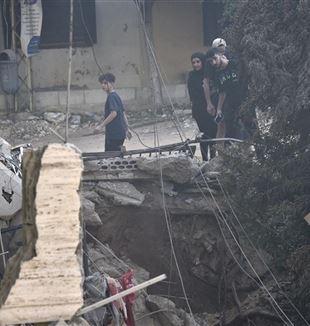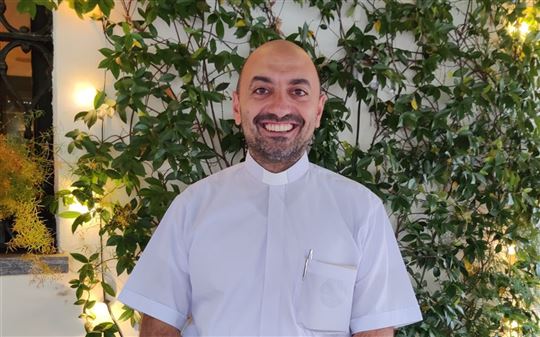
Lebanon: “The young people’s lesson amid the missiles”
The war in Lebanon, hitting a population already on its knees due to the economic and social crisis after Covid and the port explosion in Beirut. Monsignor Jules Boutros, local leader of the Patriarchal Church of Antioch of the Syrians, speaks about it.“The blame. Everyone asks whose fault it is: Hezbollah's, Israel's, Iran's, the Lebanese political class... But 1,200 civilians dead within a few hours is something beyond understanding. 300 wounded, and who knows how many more unknown casualties. Early estimates tell us that over 500,000 displaced people are pouring out of southern Lebanon into the north, here in Beirut, or into Syria. There are hundreds of missile attacks a day, hospitals are already collapsing. Lebanon has entered the war, war is now. And before that there was the Covid, the explosion at the port, the economic crisis....” The picture painted by Monsignor Jules Boutros, leader of the Patriarchal Church of Antioch of the Syrians in Lebanon and a friend of the movement's small but faithful community in Lebanon, is bleak. We met him in Milan, on the sidelines of the Oasis Foundation Conference devoted to the relations between the West and the Muslim world. “Classrooms in schools and universities are being cleared to make room for refugees, even churches, monasteries and parishes are providing whatever they can to accommodate the families arriving. Those who can are opening their homes. We are facing something we have seen before. We are unfortunately familiar with war, but we did not expect such a quick attack. There is talk of negotiations but also of an invasion by Israel and renewed aggression from the Shiite side. In these hours, it is uncertainty that weighs the most.” Israel's killing of Hezbollah leader Hassan Nasrallah and Fateh Charif Amine, head of Hamas in Lebanon, have only exacerbated the situation.
War, once again. What was your first thought?
My first thought was for my family, my friends, my people. My nephew Thomas, who is four years old, asked me, “Uncle, why did the war come?” I replied that people argue when there is no love. He usually asks a lot of questions, but at that moment he fell silent. Yes, I think there is a lack of love, that a hatred has spread that prevents us from seeing the other as a brother. I have no solutions, but I know that we all need to work hard–Christians and Muslims–on two levels: prayer, that is, the authentic relationship with God, and the education of young people. And I say this thinking of my nephew, not abstractly.
You dedicate yourself a lot to young people…
Yes. And now because of this damned war I feel that it is more necessary than ever. Last year I was elected by the Lebanese bishops as the contact person for the Justice and Peace Commission. We have begun to work in a number of directions, and one of them concerns the training of future politicians. Indeed, the current ruling class is compromised, unable to work together for the common good. We have created the Leadership Academy for Peace, which has received the support of many associations and from the Vatican's Dicastery for Human Development. The first class was held two days ago, in the midst of war. We could have cancelled it, but we chose to do it anyway. All the young people came. All except two who could not arrive unharmed for security reasons. I said to myself: this is the first lesson these young people offer to the world. Faced with the news that only allows you to hear the sound of explosions and see images of hatred spreading, they offer a new point of view. Eighty young people defying the missiles, gathering and training to live politics as service to others: this is the true picture of hope, the only thing we can offer.
Read also - Pizzaballa: “We need to bring our pain to God"
At 41, you are the youngest bishop in Lebanon. The Middle East is emptying itself of the Christian presence, new wars shake those lands. Why do you stay?
Out of faithfulness to my vocation. There is a cry within me, of meaning, that makes me get up every morning. I come from a Christian family. My grandfather was originally from Turkey and fled to Lebanon after the massacre of Christians. I was born and raised among Maronites and Armenians, but my personal encounter with Christ happened when I was around 17-18. I played soccer, went to mass in my Christian neighborhood of Achrafye in Beirut, but knew little about the faith. Two things attracted me to Christ. The first was that I loved philosophy and was driven to a search for truth. I found my own questions within the questions of philosophers: what gives meaning to existence? The search for truth attracted me to God and, it seems almost ironic, but it was the Muslim philosopher Al-Ghazali who made me even more curious about God. The second thing that attracted me was the silence of the tabernacle, where I experienced the full presence of Jesus. After school I would spend afternoons with my friends at the oratory, and between games, I would enter the church to pause for a moment before the Eucharist. Only before Him did I feel that life was authentic, true, and that it was that Presence that I wanted to deepen through a personal relationship. The attraction that Jesus exercised on me made me fall in love with Him, so I wanted to dedicate my life to Him, to serve Him where I am.